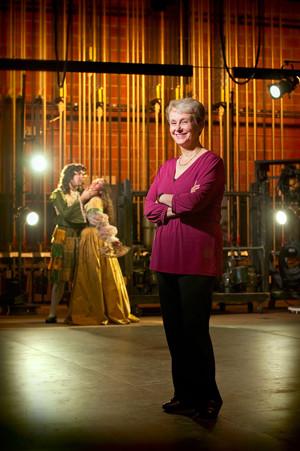Excellence in Teaching, 2011
Theatre and Dance

Simply put, Deborah Kinghorn’s job is to coax her students into talking the talk and walking the walk—with feeling, from within, naturally.
Kinghorn teaches voice, movement, and acting in holistic fashion and generally begins by helping a typical freshman loosen the facial “mask” he or she has donned to steel against the angst of adolescence.
The mask, literally a tightening of muscles attaching to the cheekbones, can set off a chain reaction of constriction that ultimately limits an actor’s true stage presence; the voice becomes high-pitched and lacks resonance, and even body posture and fluidity of movement can clamp down.
Pulling her facial muscles taut, Kinghorn demonstrates the pinched, panicky-sounding delivery. “Many students, when they first arrive, do a lot of this kind of artificial talking —they’re ‘sitting’ on their vocal cords. I try to give them a way of feeling the voice differently, of feeling the vibration in the bones of the face, of creating space in the back of the oral cavity—what many singing teachers call ‘the pear-shaped tone.’”
The fruit of this effort is not a louder voice, but one that resonates more richly from a person’s own inner environment and, like a rolling ball, leads to more confidence as the entire body gets in stride with this newfound sense of self.
Kinghorn’s work is based on that of pioneering teacher Arthur Lessac, who created the kinesensic approach to developing voice and body strength, power, and expressiveness. At its heart it is a simple process, as simple and natural as tapping into the feeling of familiar events—a long, restorative yawn or the deep inhale of a flower’s scent.
During her 11 years of schooling UNH students in this feeling process, Kinghorn has watched with delight as they go from dropping the shackles of the mask to finally standing tall on stage, and elsewhere. One student, Kinghorn recalls, returned from Thanksgiving break to report her posture had improved to a point “that she was now actually taller than her father! She had taken ownership of her height, and that became an empowering thing.”
—David Sims
About this Award
Each year, the University selects a small number of its outstanding faculty for special recognition of their achievements in teaching, scholarship, and service. Awards for Excellence in Teaching are given in each college and school, and University-wide awards recognize public service, research, teaching, and engagement.
